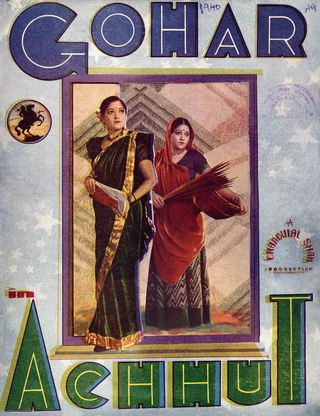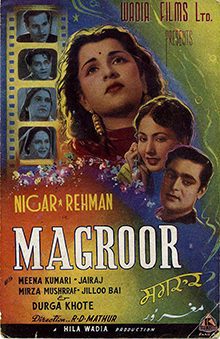Related Research Articles

Kundan Lal Saigal, often abbreviated as K. L. Saigal, was an Indian singer and actor who worked in Hindi cinema|, which was centred in Calcutta (Kolkata) during Saigal's time, but is currently based in Bombay (Mumbai). Saigal's unique voice quality which was a mixture of baritone and soft tenor was the benchmark for most of the singers who followed him. In fact it remains the gold standard even today shining through very early and practically primitive recording technology.

Khursheed Bano, often credited as Khursheed or Khurshid, was a singer and actress, and a pioneer of the Indian cinema. Her career ran through the 1930s and 1940s, before she migrated to Pakistan in 1948. Making her debut with Laila Majnu (1931), she acted in over thirty films in India. She is best known for her film Tansen (1943) with actor-singer K. L. Saigal, which featured many of her memorable songs.
Rajkumari Dubey, better known by her first name, Rajkumari, was an Indian playback singer who worked in Hindi cinema of 1930s and 1940s. Best known for her songs, "Sun Bairi Baalam Sach Bol Re" in Bawre Nain (1950), "Ghabaraa Ke Jo Hum Sar Ko Takraayan" in Mahal (1949) and "Najariya Ki Maari" in Pakeezah (1972).

Ghulam Mustafa Durrani was an Indian radio drama artist, playback singer, actor and music director.

Zindagi is a 1940 Indian film, directed by Pramathesh Barua and produced by Birendranath Sircar. Starring K. L. Saigal, Jamuna Barua, Pahari Sanyal, Shyam Laha, Sitara Devi, and Nemo, it revolves around Ratan, an unemployed university graduate, and his relationship with Shrimati, who is on the run from her cruel husband.

Achhut is a 1940 social Indian Bollywood film based on untouchability. It was the third highest grossing Indian film of 1940. The film was produced by Chandulal Shah for his Ranjit Studios. He also wrote the story and screenplay, and directed it. Achhut's premiere was attended by Sardar Vallabhbhai Patel on 23 December 1939, who stated: "If the picture helps India to remove this curse, it can be said to have helped India to win Swaraj as untouchability is one of the chief obstacles in the road to freedom".
Lagan is a 1941 Indian Hindi language film. It was the fifth highest grossing Indian film of 1941. The film was directed by Nitin Bose for New Theatres Ltd. Calcutta. The film was a bilingual with K. L. Saigal and Kanan Devi acting as the lead in its Bengali language version, Parichaya. The music for both versions was by R. C. Boral. This was the last film Saigal did for New Theatres, Calcutta, before his move to Bombay to make films for different studios there.

Bhakta Surdas is a 1942 Indian Hindi language film devotional film. It was the third highest grossing Indian film of 1942. This was K. L. Saigal's first film after his move to Bombay from Calcutta. The film was directed by Chaturbhuj Doshi for Ranjit Studios. It had music by Gyan Dutt with lyrics by D. N. Madhok. Khursheed, after acting in several less popular films, finally became a big success with this film. The cast included K. L. Saigal, Khursheed, Monica Desai, Nagendra, M. Saigal and N. Desai.
Tansen is a 1943 Indian Hindi language film directed by Jayant Desai, featuring K. L. Saigal and Khursheed Bano in the lead roles. The film was based on Tansen, the 16th century musician in the court of Mughal emperor, Akbar. The film featured 13 hit songs, performed by the leads, including "More Balapan Ke Saathi", "Rum Jhum Rum Jhum Chal Tihari", "Kahe Guman Kare Gori", "Bina Pankh Ka Panchhi", "Sapt Suran Teen Gram", "Diya Jalao" and "Baag Laga Doon Sajni". It was the second highest grossing Indian film of 1943. In 2009, it was reported that another film based on the life of Tansen would be directed by Satish Kaushik.

Sasural is a Bollywood film. It was released in 1941. The film was directed by Chaturbhuj Doshi for Ranjit Movietone. The story was by Gunvantrai Acharya with dialogues by R. S. Rammyae. Cinematographer was G. G. Gogate with audiography by C. K. Trivedi. Gyan Dutt was the music director, with lyrics by D. N. Madhok. The cast included Motilal, Madhuri, Nurjehan, Miss Iqbal, Kantilal, Tarabai, Bhagwandas, and Urmila.
Dharti Mata is a 1938 Hindi social film directed by Nitin Bose. The film was also made and in Bengali as Desher Mati in the same year by New Theatres. It starred K.L. Saigal, Uma Shashi, Jagdish Sethi, Kamlesh Kumari, and K. C. Dey. The music was by Pankaj Mullick and lyricist and dialogue writer was Pandit Sudarshan. The story, screenplay and cinematography was by Nitin Bose. The story is about two friends Ashok and Ajay, one interested in agriculture and the other in technology. Ashok goes to the village to help the farmers while Ajay goes to UK for higher studies in engineering. The film highlights the need of technology and new concepts for effective farming.
Pujarin is a 1936 Hindi social film. It was directed by Prafulla Roy for International Film Craft. The film was based on a story by writer Sarat Chandra Chattopadhyay from his story "Dena Paona". The film was the remake of the Bengali film Dena Paona directed by Premankur Atorthy. The music direction was by Timir Baran with lyrics by Pandit Bhushan and Kidar Sharma.The film starred K. L. Saigal, Chandrabati Devi, K. C. Dey, Pahari Sanyal and Rajkumari. The story is about a reckless immoral youth who marries for money then deserts his wife due to circumstances, only to return as an aristocrat and reform through the love of his wife.
Aap Ki Marzi is 1939 Hindi romantic comedy film directed by Sarvottam Badami. The film was produced under the Sudama Productions banner. The music composer was Gyan Dutt with lyrics credited to Pyare Lal Santoshi and S. P. Kalla. It starred Motilal, Sabita Devi, Khursheed, K. N. Singh, Mazhar Khan, Vasanti and Sunalini Devi. This was director Badami's second comedy film; he had earlier directed the comedy Teen Sau Din Ke Baad (1938) which turned out be a box office success. Aap Ki Marzi was based on the MGM produced, Edward Buzzell directed film Paradise for Three (1938) from Erich Kastner's novel.
Bulo C Rani was an Indian music director. He was a music director in Bollywood from the 1940s until the 1960s. He scored music for 71 films from 1943–72, including some evergreens like "hame to loot liya mil ke husn waalo ne" and others.
Dina Nath Madhok was a prominent lyricist of Bollywood in the 1940s to 1960s. He started his career with the 1932 film Radhey Sham. He wrote over 800 songs in his career spanning four decades and was regarded as one of the top lyricist in the 1940s earning himself the soubriquet "Mahakavi Madhok". Madhok is cited as one of the three "First Generation" of lyricists along with Kidar Sharma and Kavi Pradeep. Apart from writing lyrics, he wrote screenplays and directed films. He directed almost 17 films like Baghdad Ka Chor (1934), Mirza Sahiban (1939), Biwamangal (1954) and the Madhubala-starrer Naata (1955).
Mohabbat Ki Kasauti also called Rooplekha in Bengali was a 1934 Indian "semi-historical" bilingual film in Hindi and Bengali, directed by P. C. Barua for New Theatres. Though Barua is consistently mentioned as director, according to author J. K. Bajaj, Debaki Bose directed Rooplekha in 1934. It had music by R. C. Boral and the cast included Rattanbai, K. L. Saigal, Pahari Sanyal, Noor Mohammed Charlie and Vishwanath. Jamuna started her career with a small role in the Hindi version.

Chaturbhuj Doshi (1894–1969) was a Hindi and Gujarati writer-director of Indian cinema. He was one of the top Gujarati screenplay writers, who helped script stories for the Punatar productions. He is stated to be one of the leading figures who launched the Gujarati film industry with work on notable films like Gunsundari (1948) and Nanand Bhojai (1948). Doshi, was “well known” for his family socials and had become “a celebrity in his own right”. He made a name for himself as a journalist initially and was referred to as the "famous journalist" and publicist by Baburao Patel, editor of Filmindia.
C.H. Atma was a playback singer in Hindi language films, ghazal singer and film actor. He was born in 1923 in Hyderabad (Sind), now in Pakistan. His real name was Atma Hashmatrai Chainani. He was the first singer from India to tour and sing outside India in Nairobi, East Africa in 1957. He fell ill after his singing tour to England in 1975 and died eight months later on 6 December 1975, aged 52.

Magroor (transl. Proud) is a 1950 Indian Hindi-language romance film produced by J.B.H. Wadia and directed by cinematographer R.D. Mathur.
References
- ↑ Anantharaman, Ganesh (January 2008). Bollywood Melodies: A History of the Hindi Film Song. Penguin Books India. p. 143. ISBN 978-0-14-306340-7.
- ↑ Ranade, Ashok Da. (1 January 2006). Hindi Film Song: Music Beyond Boundaries. Bibliophile South Asia. p. 353. ISBN 978-81-85002-64-4.
- ↑ "Gyan Dutt". Bollywood Hungama . Archived from the original on 3 December 2013. Retrieved 28 November 2013.
- ↑ Nevile, Pran (1 January 2004). K L Saigal: Immortal Singer and Superstar. Nevile Books. ISBN 978-81-901166-1-9.
- ↑ India International Centre Quarterly. India International Centre. 2004. p. 82.
- ↑ "Gyan Dutt". Geetadutt.com. Retrieved 28 November 2013.